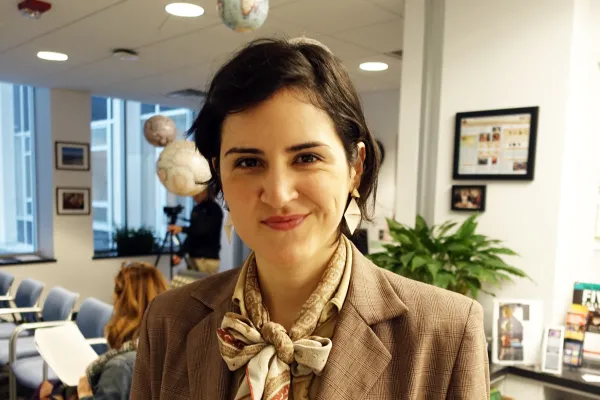Visiting Scholar Sheds New Light on Concepts of Dignity
Research & Inquiry

Published November 14, 2017
When people have dignity, what do they really have?
Zaynab El Bernoussi, a visiting scholar from Al Akhawayn University in Ifrane, Morocco, says that dignity—or karama in Arabic—is a nebulous concept that challenges individuals, as well as nations, to reflect on such myriad issues as identity, human rights and faith.
Although her research into postcolonial development focuses primarily on the institutional and cultural relationships between state and society, El Bernoussi has also made the politics of dignity a key component of her studies—especially as it relates to postcolonial Egypt during the 2011 Arab Spring protests.
El Bernoussi, who is known as “Z” on campus, is spending the fall semester as a visiting scholar at the Smith Lewis Global Studies Center and the Department of Government. She is an assistant professor of international studies at the School of Humanities and Social Sciences at Al Akhawayn University and is using her time at Smith to finalize the research on a forthcoming book, which analyzes the concept of karama and how it was used by Egyptian protesters in the Arab Spring.
Janie Vanpée, professor of French studies and comparative literature and the Elizabeth Mugar Eveillard ’69 Faculty Director of the Lewis Global Studies Center, says hosting El Bernoussi this semester is a way of “inaugurating a faculty exchange and collaboration with Al Akhawayn University that I hope Smith will be able to continue. While Zaynab is spending the fall semester on campus, Smith assistant professor of government Bozena Welborne is spending the semester at Al Akhawayn.”
At Smith, El Bernoussi has been generous with her time and knowledge, Vanpée says, and has joined a number classes that focus on the Middle East and the Muslim world. El Bernoussi is also participating in organizing “Contemporary Women and Islam: Politics and Identity,” a conference that the Global Studies Center will host February 9–10, 2018.
“Her presence and participation has enriched the dialogues that faculty and students engage with on the politics and culture of the Middle East today,” Vanpée says.
Here, El Bernoussi discusses what studying the larger questions of dignity reveals about global events and relationships between state and society:
What does dignity mean to you?
“The more I research the concept of dignity, the more it becomes confusing to me to try and define it. For now, dignity to me is a very basic personhood. It is inherent to what we are. One may ask why not just use personhood instead—and to me that is not a solution. Throughout history, people have been battling to try and find out what beings are made of, and the least we can say is that we are complex concoctions of matter and emotions. Dignity, as a concept, is particularly caught up in our self-exploration, and we must continue with this journey.”
How did violations of dignity shape the 2011 Arab Spring?
“Violence, oppression and injustice have a long history all over the world. However, marking episodes in human history such as abolishing slavery and recognizing equality of human rights are giant leaps forward. Of course, there are still cases of slavery and human rights violations in many parts of the world, but the recognition that this is wrong in our institutions is definitely more widespread. The postcolonial economic development of the Arab region has become increasingly recognized as a failure, as it did not bring prosperity, autonomy and accountability. Instead it disproportionately transferred wealth from the poor to the rich. Those indecent inequalities and the state brutality used to stifle any group that demands accountability were justifiably felt as increasingly unsustainable dignity violations.”
Can you talk more about particular concepts of dignity in Arab communities?
“The concept of dignity as we recognize it today has had different genealogies in which the word used to refer to the concept had different meanings at particular times. These trajectories are even more complicated when we look at different linguistic contexts. In English, dignity comes from the Latin word dignitas, which used to refer to a military rank. In Arabic, dignity is now translated as karama, and the word shares a trilateral consonantal root of ka-ro-ma, which is the same as the word karam, which means generosity. More investigation about the relationship between the two words in Arabic—i.e., karama for dignity and karam for generosity—is still needed. From my experience as an Arab person, a basic sense of personhood and of human worth is often expressed in gestures of giving in local cultures, so the relationship between the two concepts makes much sense.
In the book you are writing on the politics of dignity in the 2011 Arab Spring protests in Egypt, what is the central question you are hoping to address?
“The central questions in my study are what actors said about karama/dignity in 2011 and their memory of what they thought of karama two to four years after the 2011 Arab Spring. The object of the memory of karama is also quite peculiar, because it is still tied to the urgency of dignity in the face of forms of colonization and also the wound of the pan-Arabism defeat. For this research, I used multiple empirical data ranging from interviews to art analysis. The telos in this study was to capture different understandings of the concept of karama in the 2011 revolution in order to refute the argument that there could either be a universal understanding of this concept or an essentially indigenous one.”